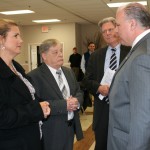Fake Solution to Fake Farms
The bill, S589, that Senator Jennifer Beck and Senate President Steve Sweeney have sponsored to address New Jersey’s “Fake Farms” will not close any fake farms and will not increase property tax revenues. It will create new bureaucracy on the state, county and municipal levels of government. It will increase the costs of municipalities evaluating what is a farm and what is not a farm.
New Jersey’s farmland assessment law dates back to 1964. It provides that properties of 5 acres that generate revenue and payments of $500 from crops or livestock be assessed as farms for property tax purposes. Properties over 5 acres must produce $5 per acre to qualify under the proposed law. $.50 per acre for wetlands. Dogs are excluded as livestock, President Obama’s childhood dietary habits notwithstanding.
S589, let’s call it “Karcher’s Law,” would increase the minimum level of revenue a “farm” must produce to $1000.
Beck used former Senator Ellen Karcher’s use of the farmland assessment law as a major issue in her 2007 campaign to replace Karcher in the Senate. Karcher classifies 6 acres of her 9 acre Marlboro home as a Christmas tree farm, saving $14,000 in property taxes.
I can see the campaign literature now. “We ended fake farms by doubling the required production of these so called farms.” Gullible homeowners will nod and be grateful that their property taxes increased only 3% while the lawyers, lobbyists, rock stars and politicians who avoid tens of thousands in property taxes send in their campaign contributions.
Products that cost $500 in 1964 would cost $3,711.05 today. 500 of today’s dollars would have bought you $67.37 of merchandise in 1964.
Clearly, increasing the required revenue generated from a “farm” from $500 to $1000 will not end the abuse. Increasing the required revenue to the inflation adjusted $3,711.05 will not end it either.
There is a provision in the proposed law that creates a State Farmland Evaluation Advisory Committee comprised of the Director of the Division of Taxation, the Dean of Rutgers College of Agriculture and the Secretary of Agriculture. The committee will conduct periodic reviews of the minimum farm revenue and payment requirements. Maybe Sweeney and Beck are counting on the bureaucrats to come up with an equitable solution to the problem. Not likely, but we can’t say for sure as neither Senator returned a call asking for an explanation of the bill.
There is another provision of the proposed bill that eliminates the “roll back tax” for fake farms that are declassified. Under the current farmland assessment law, properties that are declassified as farms are subject to retroactive property taxes at a fair market valuation for a number of years. The proposed law would only tax declassified farms at fair market value going forward, so long as the property owner continues their fake farming. Maybe this is the real intended teeth of the proposed bill. We’ll ask Beck or Sweeney if either of them calls back.
S589 was passed by the Senate Environment and Energy Committee on Thursday and sent to the Senate Budget and Appropriations Committee.
Hopefully the Senate Budget and Appropriation Committee, of which Beck is a member, will amend the bill so that it really does eliminate the practice of middle class homeowners subsidizing hobby farms of wealthy and connected landowners.











If you remember, Judith Stanley took her to task for that since she used that loophole for her magnificent house overlooking the Navesink. She raised bees and sold the honey. Paid next to nothing in property taxes, relatively speaking. I can’t fault anyone for using this as a way to lower their taxes. Better that than more development. Beck just threw her under the bus over that one.
What other kind of bill would you expect from a RINO?
This is not the best way to preserve land for valuable uses.
I want to see a provision that leads to food production incentives for all land owners, especially homeowners. It is called “Urban Farming”. It means that you put everything in food products and nothing in grass.
Here are a few of the benefits for real estate owners –
Lower taxes because all properly used land can qualify as farms. Healthier population, because organically grown food is healthier than the unknown mass market food from stores. Lower health insurance costs. Happier NJ citizens because working the land builds the spirit. And knowledge of how to feed the family in the case of a problem getting food from the stores.
And how to raise the revenue to pay for this? That is also easy but beyond the scope of this comment.
I like Gene B.’s idea – could grow grapes and dandelions, make some wine. Could grow some other products, and even smoke them.
Ooops…here come the police!
Actually, organically grown food would be better and the farmers’ market would be booming!
“Fake farmers” can now have friends and family purchase a minimum of just $1000.00 to save on thousands in property taxes??–sounds like a deal to me.
Sounds like the old existing loophole was adjusted to today’s inflation rate.
Art, can you keep us posted when/if Beck gets back to you. My past experience has shown she does not get back. Good luck!
I apologize…the inflation adjusted figure as the article says is $3711.05. Again, a very low threshold in order to receive thousands in property tax breaks. The APP had a good editorial on it today as well.
The biggest problem New Jersey has is over- development. It causes traffic, polution and high property taxes. The tax breaks to farmers actually wind up saving us money if it stops people from developing their land. It is true there have been abuses of the system. The amount of income needed should be adjusted for inflation. Perhaps the amount of acerage should be increased. However it would be a mistake to go too far. Do not throw the baby out with the bathwater.
Create multiple qualifying catagories; increase the minimum acreage from five to ten; raise the minimum amount to $12,000.